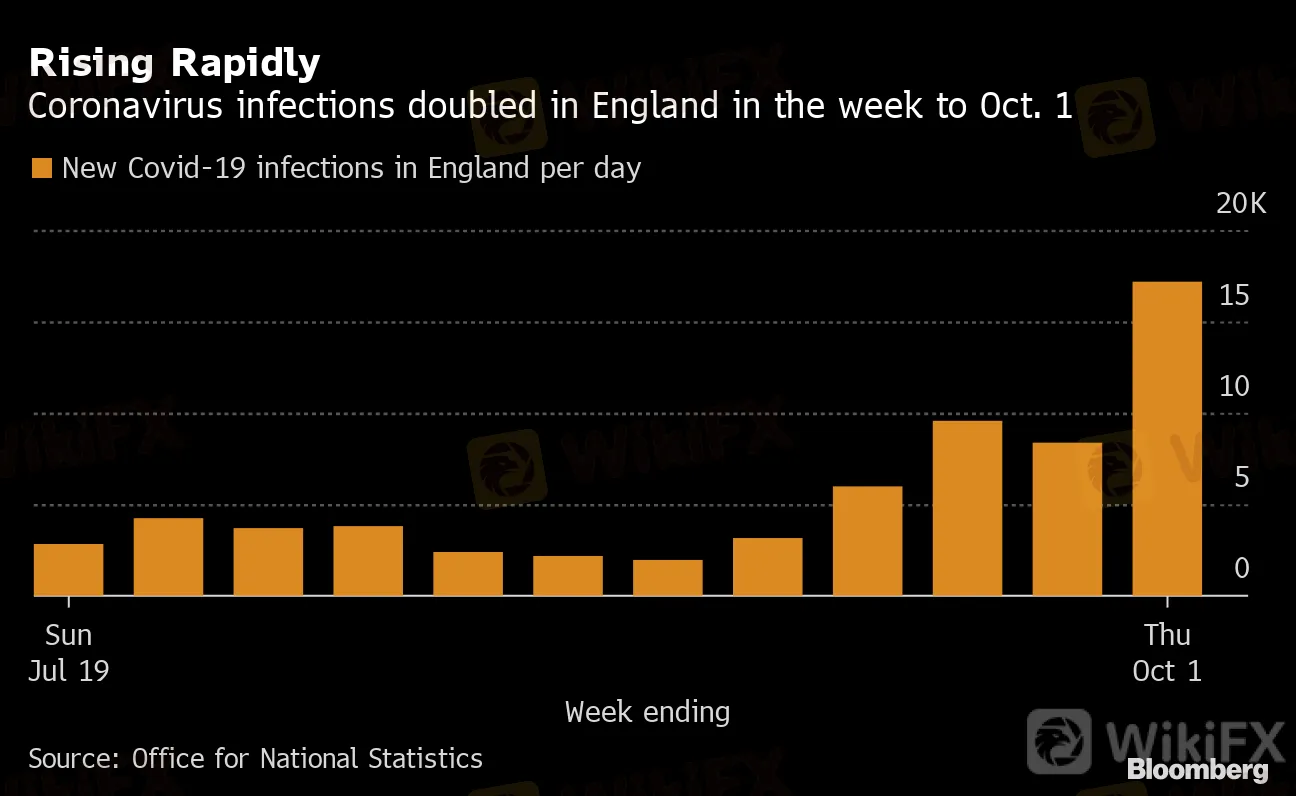简体中文
繁體中文
English
Pусский
日本語
ภาษาไทย
Tiếng Việt
Bahasa Indonesia
Español
हिन्दी
Filippiiniläinen
Français
Deutsch
Português
Türkçe
한국어
العربية
U.K. Plans Job Aid for Hot Spots as Pandemic ‘Out of Control’
Abstract:U.K. Chancellor of the Exchequer Rishi Sunak announced new support for jobs in coronavirus hot spots, as tougher restrictions are readied to try to contain a pandemic the government warned is “getting out of control.”
U.K. Chancellor of the Exchequer Rishi Sunak announced new support for jobs in coronavirus hot spots, as tougher restrictions are readied to try to contain a pandemic the government warned is “getting out of control.”
Under Sunaks plans, announced Friday afternoon, the government will pay two-thirds of the wages of workers in companies forced to close as a result of virus restrictions, and will also offer increased cash grants while they are shuttered.
The extra support, which Treasury officials said will amount to hundreds of millions of pounds a month, comes before new curbs next week which could involve shutting bars and restaurants in areas of England where the disease is spreading most rapidly.
Read more: U.K. Plans Emergency Help for Firms Facing Tighter Rules in Days
Rishi Sunak
Photographer: John Sibley/AFP via Getty Images
The new plan comes just days after Sunak opted to end the blanket aid for jobs under his original program, in favor of a policy that only helped support part-time work in “viable” roles.
While that was an attempt to curb the unprecedented cost of the plan, economists warned it could see unemployment spike beyond 3 million people. At the time Sunak said he couldnt support every job, but the resurgence of coronavirus has forced him into more action.
Starting on Nov. 1 and lasting six months, firms closed by any curbs will only have to cover tax contributions for employees that arent working -- equating to about 5% of their wages.
{18}
While thats a better deal than the 55% they were due to pay for staff fulfilling just a third of their normal hours under the previous proposals, workers themselves will see their overall pay drop to 66% of normal, from 77% under the previous plan.
{18}
Companies will also receive larger grants if they are forced to closed, with the biggest receiving as much as 3,000 pounds ($3,900) a month.
‘Unbelievably Serious’
Balancing health and economic policy in the U.K. is becoming ever more difficult, with Public Health England warning the country faces a “definite and sustained” rise in infections.
The U.K. faces an “unbelievably serious situation” with the pandemic “getting out of control,” skills minister Gillian Keegan told the BBC late Thursday.
{24}
The Office for National Statistics said Friday the infection rate almost doubled in the week through Oct. 1, with an estimated 17,200 new cases each day. The highest rates are in northern England, which is expected to be the focus of new restrictions brought in by Prime Minister Boris Johnsons team next week.
{24}
Another study, conducted by Imperial College, London, found 1 in 170 people in England had the virus between Sept. 18 and Oct. 5, with 45,000 new infections every day in the period. The report, based on tests of 175,000 volunteers, found an eightfold increase in infections in people over the age of 65 compared with the previous period.
‘Unnecessary Death’
{27}
“Our robust findings paint a concerning picture of the growing epidemic across England,” Paul Elliott, a director at Imperials School of Public Health, said in an emailed statement. “While certain areas are worse affected, if left unabated then infection trends will follow nationwide and could lead to high levels of unnecessary death and illness from the disease.”
{27}
This week, Englands chief medical officer, Chris Whitty, met with politicians from northern England and the Midlands to stress the sharp up-tick in the virus, and showed data demonstrating how pubs and restaurants are driving the infection rate.
Rising Rapidly
Coronavirus infections doubled in England in the week to Oct. 1
Source: Office for National Statistics
{34}

Meanwhile hospitalization rates are approaching the level they were at just before the country went into a national lockdown in March, according to Mark Walport, who sits on the governments emergency scientific committee.
‘Increased Risk’
{38}
“Any environment, but particularly indoors, that encourages people to mix closely, presents an increased risk,” he told BBC radio.
{38}
{40}
Since the national lockdown was lifted in June, the government has adopted what it calls a “whack-a-mole” approach, using localized restrictions to try to contain outbreaks. But the strategy hasn‘t reduced infection rates in many areas. Local authorities say that’s at least in part because there was insufficient financial support for people told to self-isolate.
{40}
On Friday, a report showed the U.K.s economic recovery slowed dramatically in August -- a month where virus restrictions were at their lowest and government support for the hospitality industry peaked.
Disclaimer:
The views in this article only represent the author's personal views, and do not constitute investment advice on this platform. This platform does not guarantee the accuracy, completeness and timeliness of the information in the article, and will not be liable for any loss caused by the use of or reliance on the information in the article.
WikiFX Broker
Latest News
BSP Shuts Down Uno Forex Over Serious AML Violations
ACY Securities Expands Global Footprint with South Africa Acquisition
Tokyo Police Arrest 4 for Unregistered FX Trading Scheme
Rupee gains against Euro
WikiEXPO Global Expert Interview: The Future of Financial Regulation and Compliance
DFSA Warns of Fake Loan Approval Scam Using Its Logo
Consob Sounds Alarm: WhatsApp & Telegram Users Vulnerable to Investment Scams
CySEC Revokes UFX Broker Licence as Reliantco Halts Global Operations
GCash, Government to Launch GBonds for Easy Investments
Bitcoin ETF Options Get Closer to Reality with CFTC Clarification
Currency Calculator


